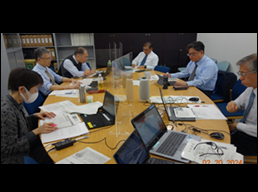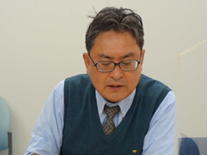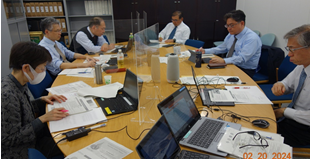
ECCJ held an intermediate meeting for carbon neutrality diagnosis as part of the FY2023 energy conservation support project for ASEAN countries
<Meeting>
Under the entrustment of the Agency for Natural Resources and Energy (ANRE), the Energy Conservation Center, Japan (ECCJ) held an intermediate meeting for carbon neutrality (CN) diagnosis on February 20, 2024 as part of the current fiscal year’s AJEEP (ASEAN-Japan Energy Efficiency Partnership) Scheme 5 activities. At the meeting, the results of ASEAN-based CN diagnoses were shared among the ASEAN countries.
(1) Reporting the results of the CN diagnosis conducted by NITTO DENKO Materials (Malaysia) Sdn. Bhd. (NMM)
(2) Reporting the results of the CN diagnosis of a public hospital (Phra Nang Klao Hospital in Thailand)
(3) Explaining an outline of the CN project start-up meeting and the plans going forward
 |  |
Opening remarks(ECCJ) | View of meeting |
As part of the current fiscal year’s AJEEP Scheme 5 program, CN diagnoses were conducted for the first time in the ASEAN region last year, targeting a factory in Malaysia manufacturing various types of adhesive tapes representing in the industrial sector and a public hospital in Thailand representing thin the building sector. The meeting this time was held for the purpose of sharing these CN diagnosis results within the ASEAN region, and there was participated ion by a total of 29 persons centered on people implementing the diagnoses including, comprising 15 persons from ASEAN countries, four persons from ACE and 10 persons from ECCJ. The results of the CN diagnoses were reported from Malaysia and Thailand, while ECCJ provided advice and comments relating to theon the materials, and discussions were also held regarding on issues in CN diagnoses.
(1) NITTO DENKO Materials (Malaysia) Sdn. Bhd. reported the results of their CN diagnosis.
(2) Two CN measures and seven energy efficiency & conservation measures were proposed, and the current CO2 emissions reduction target was set at 84.3% compared to the 2020 values.
(3) A medium to long-term plan was provisionally formulated. This will be finalized at a start-up meeting which will be held in or around August, and the CN project will be launched after obtaining supervisory approval.
(4) Reporting was made by the Department of Alternative Energy Development and Efficiency, Ministry of Energy, Thailand (DEDE) , the institution administering ASEAN trainers,
regarding the results of the ZEB diagnosis that was implemented at the public hospital in Thailand, and ECCJ was able to propose ZEB models as ZEB improvement proposals.
(5) ECCJ proposed Many energy efficiency & conservation measures could also be proposed by ECCJ relating tofor existing equipment, such as introducing inverters to pumps and controlling the numbers of air compressor units being in operationed.
(6) ECCJ explained Explanations were given that that the finalized medium to long-term plan will be formulated at the CN project start-up meeting which is plannedscheduled for August, and clarified that the CN project will be launched after upon gaining supervisory approval from superiors.
(7) Although CN diagnoses were conducted in one factory and one building in the current fiscal year, many recommended companies were nominated. Based on the results from the current fiscal year, CN diagnoses will be widely implemented to train the human resources capable of conducting CN diagnoses in the ASEAN region. This will contribute to the benefits for Japanese companies resulting from the formulation of the CN projects.Although CN diagnoses of one factory and one building were conducted in the current fiscal year, many recommended companies were nominated. Based on the results from the current fiscal year, CN diagnoses will be widely implemented to train the human resources who will enable CN diagnoses to be conducted in the ASEAN region. This will lead to benefits for Japanese companies resulting from the development of CN projects.
* AJEEP: ASEAN-JAPAN Energy Efficiency Partnership
Program for building EE&C capacity in the ASEAN region by dispatching experts and implementing training in Japan

